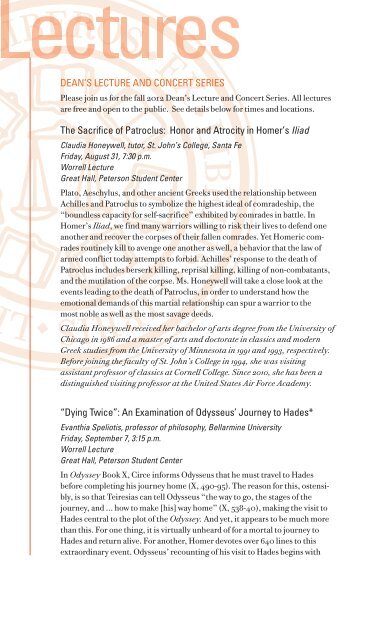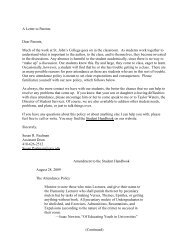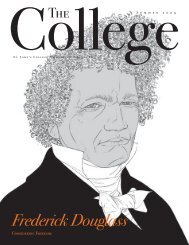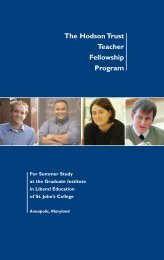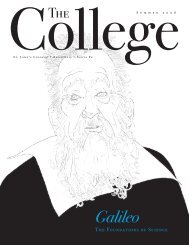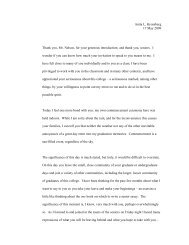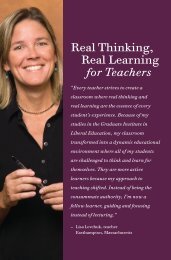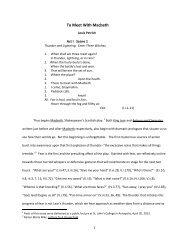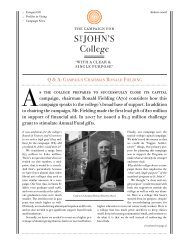COMMUNITY CALENDAR - St. John's College
COMMUNITY CALENDAR - St. John's College
COMMUNITY CALENDAR - St. John's College
Create successful ePaper yourself
Turn your PDF publications into a flip-book with our unique Google optimized e-Paper software.
DEAN’S LECTURE AND CONCERT SERIES<br />
Please join us for the fall 2012 Dean’s Lecture and Concert Series. All lectures<br />
are free and open to the public. See details below for times and locations.<br />
The Sacrifice of Patroclus: Honor and Atrocity in Homer’s Iliad<br />
Claudia Honeywell, tutor, <strong>St</strong>. John’s <strong>College</strong>, Santa Fe<br />
Friday, August 31, 7:30 p.m.<br />
Worrell Lecture<br />
Great Hall, Peterson <strong>St</strong>udent Center<br />
Plato, Aeschylus, and other ancient Greeks used the relationship between<br />
Achilles and Patroclus to symbolize the highest ideal of comradeship, the<br />
“boundless capacity for self-sacrifice” exhibited by comrades in battle. In<br />
Homer’s Iliad, we find many warriors willing to risk their lives to defend one<br />
another and recover the corpses of their fallen comrades. Yet Homeric comrades<br />
routinely kill to avenge one another as well, a behavior that the law of<br />
armed conflict today attempts to forbid. Achilles’ response to the death of<br />
Patroclus includes berserk killing, reprisal killing, killing of non-combatants,<br />
and the mutilation of the corpse. Ms. Honeywell will take a close look at the<br />
events leading to the death of Patroclus, in order to understand how the<br />
emotional demands of this martial relationship can spur a warrior to the<br />
most noble as well as the most savage deeds.<br />
Claudia Honeywell received her bachelor of arts degree from the University of<br />
Chicago in 1986 and a master of arts and doctorate in classics and modern<br />
Greek studies from the University of Minnesota in 1991 and 1993, respectively.<br />
Before joining the faculty of <strong>St</strong>. John’s <strong>College</strong> in 1994, she was visiting<br />
assistant professor of classics at Cornell <strong>College</strong>. Since 2010, she has been a<br />
distinguished visiting professor at the United <strong>St</strong>ates Air Force Academy.<br />
“Dying Twice”: An Examination of Odysseus’ Journey to Hades*<br />
Evanthia Speliotis, professor of philosophy, Bellarmine University<br />
Friday, September 7, 3:15 p.m.<br />
Worrell Lecture<br />
Great Hall, Peterson <strong>St</strong>udent Center<br />
In Odyssey Book X, Circe informs Odysseus that he must travel to Hades<br />
before completing his journey home (X, 490-95). The reason for this, ostensibly,<br />
is so that Teiresias can tell Odysseus “the way to go, the stages of the<br />
journey, and … how to make [his] way home” (X, 538-40), making the visit to<br />
Hades central to the plot of the Odyssey. And yet, it appears to be much more<br />
than this. For one thing, it is virtually unheard of for a mortal to journey to<br />
Hades and return alive. For another, Homer devotes over 640 lines to this<br />
extraordinary event. Odysseus’ recounting of his visit to Hades begins with


